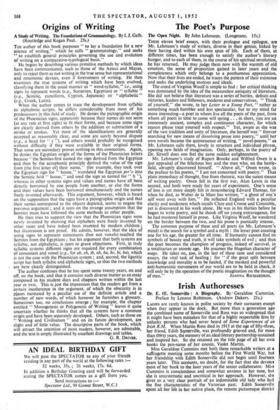The Poet's Purpose
The Open Night. By John Lehmann. (Longman. 15s.) THESE eleven brief essays, with their prologue and epilogue, are Mr. Lehmann's study of writers, diverse in their genius, linked by their having died within his own span of life. Each of them, at different times, has been enough to satisfy the author's literary hunger, and to each of them, in the course of his spiritual revolution, he has returned. He may judge them now with the warmth of old emotion, the sense of proportion gained in later years and the completeness which only belongs to a posthumous appreciation. Now that their lives are ended, he traces the pattern of their existence and seeks the underlying motives and ideals.
The creed of Virginia Woolf is simple to find : her critical thinking was dominated by the idea of the measureless antiquity of literature. She did not believe that literature was a series of battles, defeats and victories, leaders and followers, moderns and conservatives. " Think of yourself," she "wrote, in her Letter to a Young Poet, " rather as something much humbler and less spectacular, but to my mind far more interesting—a poet in whom live all the poets of the past, from whom all poets in time to come will spring . . . in short, you are an immensely ancient, complex and continuous character,, for which reason please treat yourself with respect." Yet, aware as she was of the vast tradition and unity of literature, she herself was " forever searching for new means of dissolving prose into poetry," until her own novels became the quintessence of writing, " novel-poems," as Mr. Lehmann calls them, lovely in structure and individual phrase, opening new fields of imagination. Only, perhaps, in the poetry of Dr. Sitwell does one feel the same sudden enlightenment.
Mr. Lehmann's study of Rupert Brooke and Wilfred Owen is a just appraisal of the felicitous boy and the man who, on the battle- field, abruptly discovered himself. " Above all," Owen wrote, in the preface to his poems, " I am not concerned with poetry." That plain immediacy of thought, free from rhetoric, was the surest means of writing poetry. Owen fell in the first war, Alun Lewis in the second, and both were ready for years of experiment. One's sense of loss is yet more deeply felt in remembering Edward Thomas, for when he died, as Walter de la Mare has written, " a ghost of one's self went away with him." He reflected England with a peculiar clarity and tenderness which recalls Clare and Crome and Constable, yet is discovered in his work alone. He was in his thirties before he began to wt.- ite poetry, and he shook off no young extravagance, for he had mastered himself in prose. Like Virginia Woolf, he.wandered on the border between the two, and his prose is poetically intense.
The common purpose of these and all poets (in Mr. Lehmann's mind) is the search for a symbol and a myth : the lesser poet creating one for his age, the greater for all time. If humanity cannot find its symbols of beauty and truth, it will take symbols of evil ; and thus the poet becomes the champion of progress, indeed of survival, in -a totalitarian or atomic age. He assumes the Hugolian character of mage. He takes on, too, in the last of these sane and considered essays, the vital task of healing ; for " if the great split between knowledge and morality is to be healed, if the masked and powerful anti-humanistic movements of our world are to be held in check, it will only be by the operation of the poetic imagination on the thought


























 Previous page
Previous page